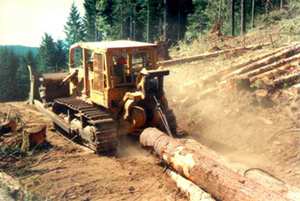
For logging, higher line speeds are usually
preferred
|
|
If you look inside an Allied winch, the most obvious thing you'll see is a bunch of gears turning on several shafts. But there is a good story behind these gears. The proper choice of gear ratio will determine the winch line speed and pulling capacity.
These gears are a type of transmission that converts the engine rotation to the rotation of the drum, which coils the wire rope. The engine typically rotates at around 1000 rpm to 2000 rpm. The winch drum, however, is turning at somewhere around 20 rpm to 50 rpm. The winch gears serve to reduce the rotational speed between engine and drum.
The gear ratio specifies the number of rotations of the PTO shaft for each rotation of the drum. A larger gear ratio number indicates a slower drum speed. Drum speed is directly related to the line speed of the wire rope.
|
|
On all Allied winches, the customer has several gear ratios to choose from. The choices are shown in both the price sheet and in the specification sheet. Let's look at a typical case, the W5C winch on a Cat D6M: The standard gear ratio is 35:1, and the optional gear ratios are 61:1 and 100:1. As shown in the table below, the line speeds drop as the gear ratio number increases. These speeds are determined at governed engine rpm.
|
W5C Gear Ratio |
Bare Drum Line Speed, Ft/Min. |
|
35:1 |
179 |
|
66:1 |
89 |
|
100:1 |
59 |
The lower gear ratio delivers two key benefits: increased pulling power, and greater control over line position.
Higher line speed, or lower gear ratio number, tends to be preferred by loggers, where productivity is important. Lower line speed tends to be preferred where higher line pull or finer control of line position is required. Equipment rescue operations and mining applications need high line pull. Pipelaying and lowering demand accurate line positioning.
To help your winch customer make the right choice, be sure to determine the application for the winch. If in doubt on which ratio to recommend, give Allied a call for technical advice.